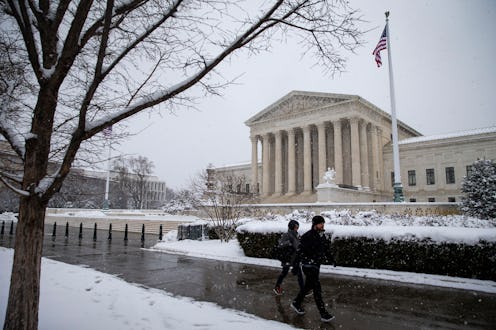News
SCOTUS Rules That Prisoners Don't Have The Right To "A Painless Death"

The Supreme Court found that it is constitutional to execute a Missouri man by lethal injection — even though it may cause him "severe pain." The 5-4 ruling written by Justice Neil Gorsuch paves the way for the man's death over Eighth Amendment claims that the killing would amount to "cruel and unusual punishment."
The death row inmate, Russell Bucklew — who was convicted of kidnapping and raping an ex-girlfriend and murdering a neighbor — had proposed nitrogen gas instead, but Gorsuch wrote that there was little evidence to show that the substitute would "significantly reduce his risk of pain." The justice also accused Bucklew of using the legal system to try to avoid his death, "through lawsuit after lawsuit."
Bucklew suffers from cavernous hemangioma, which means that he has tumors growing through much of his neck, throat, and head. His legal team argued that the drug Missouri proposes injecting, pentobarbital, would burst those tumors, causing Bucklew to suffocate. That, they argued, would be "excruciating."
Gorsuch, writing for the majority, didn't agree. He said that "the people of Missouri, the surviving victims of Mr. Bucklew's crimes, and others like them deserve better" than to wait for a less painful option for Bucklew. He wrote that the Eighth Amendment “does not guarantee a prisoner a painless death — something that, of course, isn’t guaranteed to many people, including most victims of capital crimes,” according to The Hill.
He also wrote that it's not the court's role to decide the "question of capital punishment," and that it should not delay executions at the last minute either:
Under our Constitution, the question of capital punishment belongs to the people and their representatives, not the courts, to resolve. The proper role of courts is to ensure that method-of-execution challenges to lawfully issued sentences are resolved fairly and expeditiously. Courts should police carefully against attempts to use such challenges as tools to interpose unjustified delay.
The dissent took an entirely different stance. Justice Stephen Breyer noted the pain that Bucklew would suffer, "that executing him by lethal injection will cause the tumors that grow in his throat to rupture during his execution, causing him to sputter, choke, and suffocate on his own blood for up to several minutes before he dies."
That, to Breyer and the other three dissenting justices, meant a risk of "subjecting him to constitutionally impermissible suffering," a violation of the Eighth Amendment. "Bucklew has provided evidence of a serious risk that his execution will be excruciating and grotesque. The majority holds that the State may execute him anyway," Breyer wrote. The dissent also questioned whether it makes sense to require Bucklew to identify a better way to be executed.
In a separate dissent, Justice Sonia Sotomayor also questioned the majority's focus on speed. "There are higher values than ensuring that executions run on time," Sotomayor wrote in her adjoining dissent. "If a death sentence or the manner in which it is carried out violates the Constitution, that stain can never come out. Our jurisprudence must remain one of vigilance and care, not one of dismissiveness."
Unlike other issues where Chief Justice John Roberts has sided with the liberal wing, there is now a clear majority in favor of the death penalty. The 2018 Gallup poll on the issue showed a slight majority of Americans, 56 percent, also favor it, though there have been efforts to change the law in some states in recent years.
For now, state-level efforts to oppose the death penalty will be the only option.